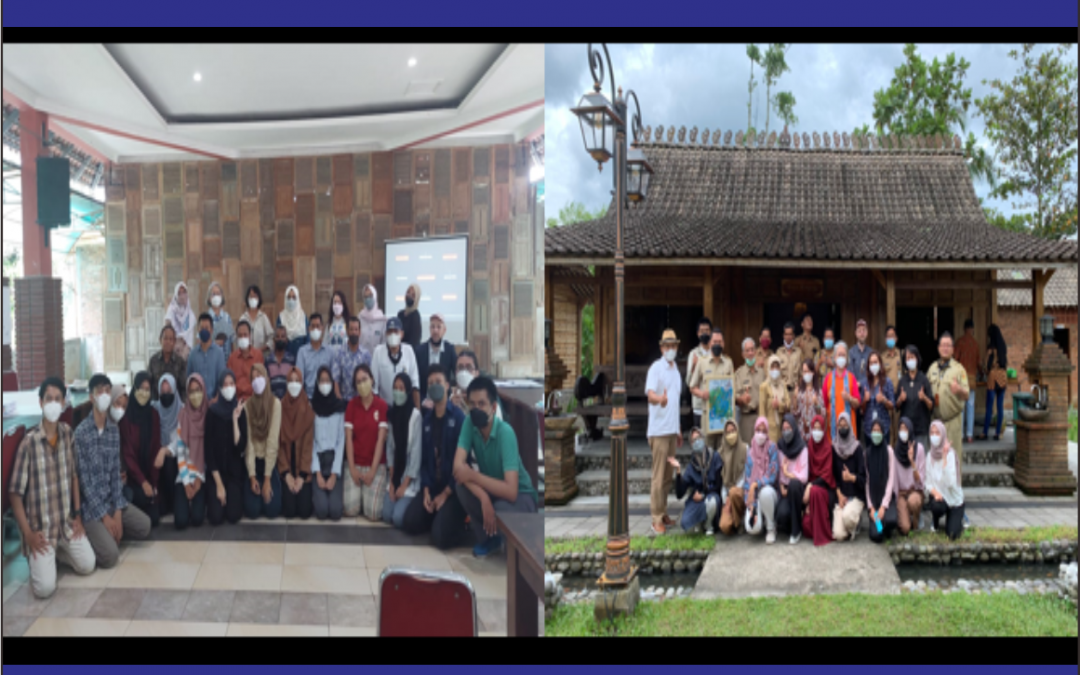Department of Urban and Regional Planning – Diponegoro University (Prof. Dr.-Ing. Wiwandari Handayani) involves in the collaboration work with the Department of Urban and Regional Planning – Gadjah Mada University, MARS Architects – Dynamic City Foundation, and Krill o.r.c.a to further investigate Urbanization in Java Island. The collaboration work so called Metro Java 2045 (http://metrojava2045.org/). As part of the project activities, the “Workshop of Metro Java 2045 Landscape Urbanism” was held on Sunday – Tuesday, February 13-15, 2022. This activity is a follow-up to the “Expert Workshop on the Study of Metro Java 2045” which was held in September and December 2021. The theme of this activity is generally related to Sustainable Development Goals 11/SDGs 11 (Sustainable Cities and Communities). This workshop aims to gather various ideas and input from participants and key persons related to the planning concept of “Reconnected Villages” in Borobudur Area, taking the case of Ngrajek Village, Mungkid District. This workshop also involved students from the Department of Urban and Regional Planning, Universitas Gadjah Mada, who took the International Joint Studio course as ecy activitiesparticipants in the activity.
The workshop lasted for three days offline and brought together various stakeholders, from village representatives to the central government. The activity on the first day took place in Progosari, Mungkid District, followed by representatives of the Ngrajek Village community, the Saujana Borobudur Community, and the Jogjakarta Heritage Society (JHS). The first day’s activities generally aimed to find out the opinion of the key persons from the community side regarding the planning concept of Ngrajek Village, which was viewed from the elements of the environment and resilience, planning, development, and partnership. The discussion results on the first day included the need for attention to the development of aquaculture in Ngrajek Village and the optimization of Village-owned enterprises/Badan Usaha Milik Desa (BUMDes) to support the local economic development of the community.
Furthermore, the activity on the second day took place in Ulam Ngrajek Village, which was attended by representatives from the Jogjakarta Heritage Society (JHS), the Ngrajek Village Government, the Magelang District Fisheries Service, BAPPEDA, and Litbangda Magelang District, and the Magelang District Food Security Service. Carrying the same discussion concept as the first day, the activities on the second day aimed to gather ideas and input from the stakeholder/government side. The concept of urban village planning around the Borobudur area is discussed based on four elements: development, planning, environment, and cooperation or governance. The discussion results on the second day included the need to prioritize conservation and preservation efforts around the Borobudur Area in developing the concept of “Reconnected Villages”.
The activity on the last day (Tuesday, 15 February 2022) began by discussing an overview of the workshop’s results on the first and second days. It continued with the delivery of ideas and input from the key persons.
Documentation of the Second Day of the Metro Java 2045 Workshop (Monday, 14 February 2022)
The speakers who attended the third day of the workshop were representatives from the village government to the central government, such as the Ngrajek Village Government, Expert Staff of the Magelang Regent, BAPPEDA and Litbangda Magelang Regency, Central Java Province PUSDATARU Office, and the Borobudur Conservation Center. It also attended by academic representatives from the Department of Civil Engineering and the Department of Urban and Regional Planning, Diponegoro University. The discussion on the last day resulted in several conclusions. The planning in Ngrajek Village and around the Borobudur Area must be effective, implementable, and prioritize the environment and aspects of cultural heritage by considering the applicable regulatory instruments. All inputs from the three-day workshop participants will be considered in developing a more mature Metro Java 2045 concept. In the long term, there will be plans to develop a virtual planning platform so that all communities and stakeholders can be inclusively involved in the planning process.




